SUMMARY
This is AI generated summarization, which may have errors. For context, always refer to the full article.

SUVA, Fiji (UPDATED) – Fiji began a massive clean-up on Sunday, February 21, after the most powerful cyclone in the Pacific island nation’s history left a trail of destruction, killing five people and crippling vital infrastructure.
The category 5 super-storm lashed the popular tourist destination overnight Saturday, packing wind gusts approaching 300 kilometers (185 miles) per hour, according to the Joint Typhoon Warning Center.
Prime Minister Voreqe Bainimarama and the Red Cross said five people were killed.
Officials said one man died on Koro Island, reportedly from debris sent flying during severe tropical cyclone Winston, the first-ever storm system to hit Fiji measuring a maximum category 5.
Aid agencies admitted they simply had no idea about the full extent of the destruction, as Fijians shared pictures on social media of roofless houses, flooded streets and metal signposts bent over by the wild winds.
Save the Children Fiji chief Iris Low-McKenzie said it was too early to assess the impact on outlying islands, although unconfirmed reports said thousands of homes had been destroyed and entire villages flattened.
“I’m especially concerned about the remote communities in outlying areas that we haven’t been able to contact yet,” she said.
“Until communications are re-established and we assess the damage, we won’t know the full extent of the situation.”
‘Assault on Fiji
The capital Suva escaped the full fury of the storm but Low-McKenzie said it was still a terrifying experience.
“I’ve never experienced anything like this,” she said. “The noise was frightening as roofs were blown off homes and trees were ripped out by their roots.”
Bainimarama said the storm amounted to an “assault on Fiji”, an impoverished nation of about 900,000 heavily reliant on its tourism industry.
“It is being described as one of the most powerful in recorded history… as a nation, we are facing an ordeal of the most grievous kind,” he said in a national address late Saturday.
Bainimarama declared a state of natural disaster, to remain in place for one month, and the government imposed a curfew “to ensure the safety of all Fijians”.
All schools, many of which are being used as evacuation centers, were ordered closed for one week.
Many residents spent the night huddled in the shelters, where they were given food and water.
Falling trees cut power and blocked roads on the main island of Viti Levu, where all flights were cancelled as high winds buffeted Nadi international airport.
Suva resident Danny Southcombe said while the capital escaped the brunt of the storm, it was still brought to a standstill.
“It’s pretty calm now but when I look around all I can see is trees on the road,” he told Agence France-Presse.
The military cancelled all leave and mobilized troops for the relief effort.
New Zealand led the international response, sending P-3 Orion aircraft to help assess damage in remote communities, while Australia’s Foreign Minister Julie Bishop offered to do the same.
The acting head of the Red Cross’s Pacific office Ahmad Sami said an accurate gauge of the storm’s impact would take time.
“We anticipate that humanitarian needs will be very high,” he told Agence France-Presse.
“This is the first time that Fiji has experienced a cyclone of this magnitude in their history, a category five, so we’re still trying to find out the figures.”
He said priorities were restoring power and repairing damaged homes, as well as maintaining drinking water supplies in more than 700 evacuation centers.
The UN humanitarian agency OCHA said hospitals had been badly damaged in Suva and Ba township as Winston “cut a path of destruction across Fiji’s islands”.
The Fiji Meteorological Office said the cyclone had moved out to sea about 230 kilometers west of Nadi by mid-morning Sunday, although the islands could still expect strong winds, heavy rains and powerful swells.
International airline Virgin Australia is set to resume flights from Australia Monday, when the curfew is also set to be lifted. – Joshua Kuku, AFP / Rappler.com
Add a comment
How does this make you feel?
There are no comments yet. Add your comment to start the conversation.